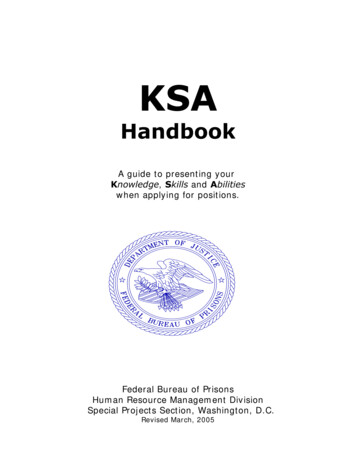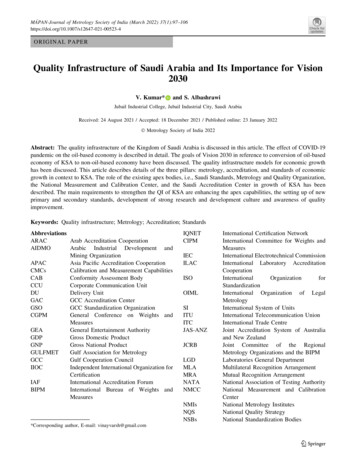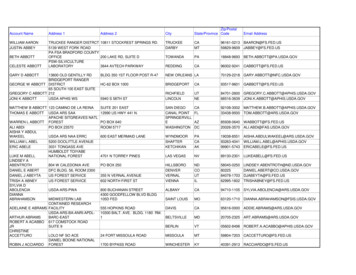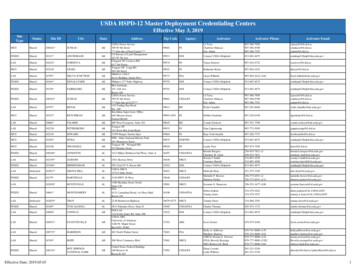
Transcription
KSAHandbookA guide to presenting yourKnowledge, Skills and Abilitieswhen applying for positions.Federal Bureau of PrisonsHuman Resource Management DivisionSpecial Projects Section, Washington, D.C.Revised March, 2005
KSA HandbookPart 1. Understanding KSAs . . . . . . . . . . . . . . . . . . . . . . . . . . .1.1. Knowledge, Skills, and Abilities and the ApplicationProcess . . . . . . . . . . . . . . . . . . . . . . . . . . . . . . . . . . .1.2. What are KSAs? . . . . . . . . . . . . . . . . . . . . . . . . . . . . .1.3. Why are KSAs Important? . . . . . . . . . . . . . . . . . . . . .1.4. How is the Crediting Plan used for Merit Promotion?.1122Part 2. Writing Responses to KSAs . . . . . . . .2.1. Preparing Responses to KSAs . . . .2.2. Developing KSA Responses . . . . . .2.3. Other Tips on Responding to KSAs2.4. Sample KSA . . . . . . . . . . . . . . . . . .2.5. Action Verbs . . . . . . . . . . . . . . . . .3345910. 1
Federal Bureau of Prisons, HRMD, KSA HandbookPage 1Part 1. Understanding KSAs1.1. Knowledge, Skills, and Abilities and the ApplicationProcessCandidates applying for positions often must include written responses toKnowledge, Skills, and Abilities (KSAs) along with their resume, SF-171 orthe Optional Application for Federal Employment (OF 612) for GeneralSchedule positions. The KSAs are listed on vacancy announcements andrequire applicants to describe experience which demonstrates theirpossession of the respective KSAs.1.2. What are KSAs?KSAs are qualities needed by applicants to successfully perform their job.They are used in the Merit Promotion process to distinguish the "highlyqualified candidates" from among the "qualified" candidates. KSAs aredefined as:KNOWLEDGEAn organized body of information, usually factual or procedural in nature.For example, "Knowledge of Contract Law and Regulations" could be used asa KSA for a Contract Specialist position.When responding, applicants should indicate what contract laws andregulations they are familiar with, discuss how they applied these laws andregulations in the work environment, and describe other significant situationsthey were involved in.SKILLThe proficient manual, verbal, or mental manipulation of data or things. Forexample, "Skill in Operating Personal Computers" could be used as a KSA fora Computer Assistant position.When responding, applicants should indicate what type of personalcomputers they have operated, discuss the various types of softwareprograms they have used, and describe how these programs were applied intheir work environment.ABILITYThe power or capacity to perform an activity or task. For example, "Ability toIdentify Signs of Discord, Tension, or Abnormal behavior" could be used as aKSA for a Correctional Counselor position.
Federal Bureau of Prisons, HRMD, KSA HandbookPage 2When responding, applicants should discuss the various signs of suspiciousbehavior they have encountered, how they responded, and indicate whatimpact it had on the work environment.1.3. Why are KSAs Important?KSA's are EXTREMELY IMPORTANT in the merit promotion evaluationprocess. Poor responses may prevent you, as an applicant, from beingconsidered among the best qualified group. Remember, your score forexperience is based solely on your responses to the KSAs, not theinformation included in your resume, SF-171 or Optional Application forFederal Employment (OF-612).1.4. How is the Crediting Plan used for Merit Promotion?Upon receipt of your application package and KSA responses, the HumanResource Management staff will determine whether you meet the minimumqualifications for the position. Once minimum qualifications have beendetermined, the crediting plan is used to evaluate your responses.A crediting plan is a three tier rating instrument. For each KSA in thecrediting plan, scores are assigned for the highly successful, successful andbarely successful level. Each level has a description of bench marks, whichare examples of tasks a candidate would perform at that level.In using the crediting plan, the Human Resource Management Staff willassign a numerical score based on your responses to the KSAs. Once thetotal score (responses to KSAs, performance appraisal, training) isdetermined, you will be ranked among other applicants. Those applicantswho scored in the range of the highest scores will have their names includedon the Best Qualified List. The Best Qualified List is forwarded to theSelecting Official, who ultimately makes the selection for the vacancy.
Federal Bureau of Prisons, HRMD, KSA HandbookPage 3Part 2. Writing Responses to KSAs2.1. Preparing Responses to KSAsPrior to responding to KSA's, gather and review information on past andpresent experience. Remember, you do not have to restrict your responsesto your present position, but can discuss related past experiences.Check the following sources that are available to you when preparing torespond to KSA's:!Get a copy of the vacancy announcement and read it thoroughly.Review the experience requirements in the vacancy announcement todetermine if you have related experience.!Pull out your current SF-171/resume/Optional Application for FederalEmployment (OF-612) and make sure it is updated. You do not wantinformation in your application package to be in conflict with yourresponses to the KSAs.!Get a copy of any documents which will give you information thatcould be included in your KSA responses (i.e., college transcripts,training records, awards, documents you have written, etc.).!If you prepare weekly or monthly status reports regarding the workyou perform, gather them to review. These reports could provideinformation regarding past assignments, projects, or activities thatneed to be addressed in your KSA responses.!Review you previous performance or progress review.!Scan your computer directories and disks to help you remember pastwork assignments. Again, there may be a critical information thatcould be used in addressing your KSAs.!Talk to someone currently in the position/discipline in which you'reinterested if possible. This works especially well for applicants who arecontemplating a career change. In addition, it may help you determinewhether there is any correlation between your experience and theposition you are applying for, prior to addressing the KSAs.
Federal Bureau of Prisons, HRMD, KSA HandbookPage 4!Maintain a personal notebook, table, or journal. You can record yourmajor accomplishments, projects or activities as they occur. When it istime to respond to KSAs, you will have information at your fingertips.2.2. Developing KSA ResponsesOne of the most common errors made in addressing KSAs is to start writingrandomly or haphazardly. Applicants may jot down thoughts with noorganization and structure, and in some cases, no relationship to the KSA.What is written initially is put on paper and attached to the applicationpackage.Of course, there should be brainstorming involved when preparing yourresponses to KSAs. Prior to responding to each KSA, think about what typeof tasks you performed and why you performed them in relationship to theKSA. Think about for whom you performed the tasks. Ask yourself whetheryou made any major accomplishments. When performing these tasks, did asignificant impact on the work environment occur?By asking these questions, you think critically and objectively about thetasks you performed. In addition, it will help remind you to think "only"about tasks directly related to the KSA.Of course, there are times when a particular task performed will apply tomore than one KSA. In those situations, you may discuss the same taskunder different KSAs, but be sure to show the direct relationship of the taskto the additional KSAs.To reinforce the idea of organizing your thoughts when responding to KSAs,ask yourself these five standard questions as a "checklist" regardingindividual tasks you performed.1.2.3.4.5.What action was performed?Why was the action performed?For whom was the action performed?What were the accomplishments?Did the action produce a significant impact on otherswork environment?or the
Federal Bureau of Prisons, HRMD, KSA HandbookPage 5When preparing KSA responses, you sometimes may write a long list ofexamples of tasks for each KSA. If the responses become too long, identifythose tasks which are most critical.How can you decide which examples of tasks to keep in comparison to thosethat can be discarded? Use the following type of tasks to represent yourexperience, when possible:LEADERSHIPUse tasks that demonstrate your leadership, organization, ormanagement skills. For example, applicants should discuss their roleon committees and/or taskforces; discuss how they planned activitiesand events; or discuss their responsibilities in managing groups ofindividuals in various settings (i.e., office, classroom,organization/club, correctional environment).FUNCTIONING IN A STRESSFUL ENVIRONMENTUse tasks that demonstrate your ability to effectively deal with stressrelated events/activities. For example, applicants could discuss theirresponsibility for inmate work details, describe their counselingexperience, or discuss how they dealt with critical deadlines.COMPLEXITY AND/OR CREATIVITYUse tasks that demonstrate complexity or creativity. For example,applicants could describe how they designed programs for personalcomputers, prepared papers on technical subjects, or used formulas toderive solutions.PERTINENCE TO THE POSITIONFrequently, applicants apply for positions outside their own discipline.However, applicants who have experience directly related to theposition and include this in their responses, will usually be awardedthe higher points.MAJOR IMPACT OR SIGNIFICANT OUTCOMEUse tasks where your actions had an impact on others or the workenvironment. For example, applicants could discuss procedures theydeveloped for their office that streamlined operations; discuss howthey negotiated a contract that resulted in a favorable outcome; ordescribe how their input on a project made a significant impact on theorganization.
Federal Bureau of Prisons, HRMD, KSA HandbookPage 6Applicants who respond to KSAs by showing a relationship to any of theabove areas are more likely to receive more points for their responses.Place yourself in the panel member's seat and think about what you wouldlook for if making the selection.2.3. Other Tips on Responding to KSAsListed below are additional tips to use when responding to KSAs:!Express your accomplishments in specific or measurable terms. Forexample, "developed and wrote operating proceduresfor.participated in five program reviews.provided trainingonce a month to groups of 10 to 15 employees on.supervisedapproximately 10 inmates in ."!When describing work experience, be specific about your role incompleting tasks. Sometimes it is difficult for reviewers to determinewhether the applicant performed the task alone, assisted, orparticipated as part of the group, if not specifically stated.!Show increases in production over a time period. For example,"developed operating procedures used by the division that reducedprocessing time by 50%."!Don't be modest in describing your accomplishments. Thosereviewing your application cannot assume any level of experience thatis not documented. In addition, they will not assume you performedcertain tasks based on your "job title."!Be honest and consistent in your responses to your KSAs and on yourresume, SF-171, or Optional Application for Federal Employment (OF 612). References may be checked, so resist the temptation toexaggerate the truth. Information in your "KSA responses" should notbe in conflict with your "resume, SF-171, or Optional Application forFederal Employment (OF-612)".!Use strong action verbs describing your experience. Reviewers arelikely to be impressed with direct language rather than vague orflowery prose. Avoid repetitive language and cliches, such as "I'm apeople person." See the listing of Action Verbs.!Don't try to "snow" the Employee Services Staff and panel membersby passing off a "philosophy" for knowledge or experience. When you
Federal Bureau of Prisons, HRMD, KSA HandbookPage 7lack certain experience, indicate any relevant training or academiccourse work. Use examples of volunteer work experience. Bothvolunteer and paid work experience are acceptable.!Proofread! Proofread! Proofread! Get a coworker, supervisor, orother associate to help you proof your responses. Lack of attention toyour grammar and spelling may diminish your written responses andleave lasting impression on the rating panel.!Don't borrow language from your position description when writingyour responses. Remember, managers and supervisors help prepareposition descriptions and are familiar with its content. Paraphrase andmake the language in the response your own.!Remember to include all training/education related to the KSAs in yourresponses --- including job-related cross development courses. Donot expect the Employee Services Staff or panel members to guesswhat training might be applicable to the KSA by referring to yourapplication. It is your responsibility and failure to do so may cost youvaluable points.!Type your responses. Why? It looks more professional and is easierto read and understand.!Keep your responses no longer than 1 and ½ pages. Remember, getto the point and avoid including insignificant information.!For each KSA, use either bullets "!" at the beginning of each responseOR a paragraph format. If you use paragraphs, be sure to limit yourparagraph size.!Spell out all terms prior to using acronyms. Employee Services Staffand panel members may not always be familiar with abbreviated termsused in various disciplines.!Do not refer reviewers to other parts of your application (i.e., SEEBlock A of my SF-171) as a response to your KSAs. Produce yourwritten response in a format similar to the sample response shown onpage 9. There are no predefined forms for KSAs.One of the most common errors applicants commit from the above list dealswith using flowery or subjective language in KSA responses. Be objective by
Federal Bureau of Prisons, HRMD, KSA HandbookPage 8stating the facts and avoid subjective comments about yourself as much aspossible.Let's look at responses to the KSA "Ability to communicate orally" fromApplicant X who is applying for an Employee Services Manager position.Ability to com m unicate orally.As an Em ployee Services Specialist, I interact with a variety of people,from staff to m anagers regarding training needs. I provide training tostaff on a variety of topics. I set up training for staff. I m eet withvendors. I have had m any em ployees thank m e for providing themw ith a better understanding of their training needs. M y supervisortold m e I was doing a great job and .Applicant X provides limited detail regarding the tasks being performed. Inaddition, subjective information regarding how others feel about him isincluded.Applicant X was given the task of rewriting his response based on KSA tipspreviously discussed. Now, let's look at Applicant X's final response on theSAF after thinking more about the tasks he performed.In the second KSA response (see next page), the applicant specificallydiscusses the type of people s/he interacts with, the purpose of thosecontacts, and what accomplishments have been achieved.If you can remember to:!prepare;!ask the five standard questions;!avoid including subjective remarks in your KSA statements asmuch as possible;!and keep in mind the additional tips given on writing responsesto KSAs;you should be able to improve your KSA responses and subsequently, yourscores. Good Luck!IMPORTANTREMINDERS: There are no KSA forms. You must produce your written response inthe suggested format on page 9. Be sure to include the vacancyannouncement number and KSA you are addressing at the top of thepage and your name and date at the bottom of the page. Remember also to include the name and telephone number ofindividuals who can verify your experience.
Federal Bureau of Prisons, HRMD, KSA HandbookPage 92.4. Sample KSAELEMENT: ABILITY TO COMMUNICATE ORALLY.For:05-BRO-025Announcement No.Employee Services ManagerPositionGS-201-13Series - GradeAs a Supervisory Employee Services Specialist, I interact with staff, managersand supervisors on a daily basis to convey information on training programs,provide guidance on training needs, and supervise employee development staff.Specifically, I perform the following tasks:! Conduct numerous training classes, both formal and informal, to groups of 15to 35 individuals on such topics as "Instructors Skills", "Planning for YourFuture", "Career Growth", "Using Lotus-1-2-3", "Providing Guidance to YourEmployees" and "Basic Functions of the PC".! Meet with managers, supervisors, and vendors to discuss training that is neededfor specific groups, divisions, or sections.For example, the agency'sAdministrative Division had an influx of new secretaries who lacked Lotus 1-2-3experience, which was now needed for a major long term project in the Division.After determining the Division's training needs and meeting with managers, Iprovided training to all secretaries. This training contributed to theDivision meeting projected deadlines for work output.! Brief upper management on specific budget needs and operating costs foremployee training. In addition, I gave a formal presentation to uppermanagement for an agency wide training program. Although the agency was facingcuts in other program areas, I was able to persuade management to approve thistraining.! Supervise and provide guidance to 5 employees in the Employee DevelopmentDivision. In addition, I meet with subordinates several times during therating period to discuss employee concerns, goals, progress reviews, and thefinal performance rating. This past rating period, I developed an "ImprovementPlan" that encompassed additional on-the-job training and formal trainingclasses for employees who were weak in specific areas. I guided them inmeeting established goals. Due to the positive turn-around in employeeperformance, this "Improvement Plan" has been deemed a success by uppermanagement.! I have completed the following training courses: 1) Effective Communication,1/03; 2) Improving Supervisory Skills, 4/02; and 3) Negotiation with Others,10/04.! I was selected as "Supervisor for the Quarter" 4/03 to 6/ 04 by staff due tomy concerns, interests, and efforts in helping subordinates to improve theirperformance.Verifiable by:Name & TitleApplicant: Ms. ApplicantPhone NumberDate:
Federal Bureau of Prisons, HRMD, KSA HandbookPage 102.5. Action VerbsBelow is a listing of action verbs that you may wish to use when preparing your written responses to KSAs.accel er at edacco m pl i shedacqui r edadapt edadm i ni st er edadv ancedanal y zedant i ci pat edappl i edappo i nt edappr ai sedappr o v edar r angedassessedassi st edassum edassur edaudit edaw ar dedb r i ef edb u dget edb ui l tcat al o gedcausedchangedcl assi f i edco l l ect edco m m andedco m pet edco m pi l edco m pl et edco m po sedco m put erco ncei v edco ncept ual i zedco nduct edco nst r uct edco nt r act edco nt r o l l edco nv enedco nv i ncedco o r di nat edco unsel edcr eat edcutdeal tdeci deddel i v er eddem o nst r at eddesi gneddet ai l eddet er m i neddev el o p eddev i seddiagno seddi r ect eddi sco v er eddi spl ay eddi ssem i nat eddi st r i b ut eddo cum ent edd o u b l eddr af t edear nededi t eded u cat edef f ect edel ev at edel i m i nat edem pl o y edenab l edenco u r agedenf o r ceden gi n eer edenl ar geden l i st edensur edequi ppedest ab l i sh edest i m at edev al uat edex ceededex cel l edex ecut edex hi b i t edex pandedex pedi t edex pl ai nedex t endedf acedf aci l i t at edf ashi o nedf i l l edf i l m edf i nancedf i ni shedf o cusedf o r ecastf o r gedf o r m al i zedf o r m edf o r m ul at edf o st er edf o u ghtf oundf ul f i l l edf unct i o nedf ur t her edgai nedgar ner edgen er at edgo v er nedgr ant edguar ant eedgui dedhal v edheadedhel pedhi r edho st edi l l ust r at edi m pl em ent edi m pr o v edi m pr o v i sedi nco r po r at edi ncr easedi nf o r m edi nf l uencedi ni t i at edi nno v at edi nspi r edi nst r uct edi nsur edi nt egr at edi nt ensi f i edi nt er act edi nt er pr et edi nt er v i ew edi nt r o ducedi nv ent edi nv est edi nv est i gat edi ssuedj o i nedj ust i f i edk eptk ey no t edl aunchedl ear nedl edl o cat edm ai nt ai nedm anagedm andat edm ar k et edm ast er edm edi at edm o d el edm o ni t o r edm o t i v at edm o v ednam ednego t i at edo b t ai nedo f f er edo f f i ci at edo penedo per at edo r der edo r gani zedo r i gi nat edo v er co m esuper v i sedpai dpar t i ci pat edper f o r m edper suadedpi l o t edpi o neer edpl acedpl annedpr epar edpr esent edpr ev ent edpr o cur edpr o f essedpr o f i t edpr o gr am m edpr o h i b i t edpr o j ect edpr o v i dedpub l i shedqual i f i edr ank edr ecei v edr eco gni zedr eco m m endedr eco nci l edr ecr ui t edr educedr egul at edr enego t i at edr eo r gani zedr epl acedr epl i edr epo r t edr epr esent edr esear chedr eso l v edr espo ndedr ev am pedr ev i ew edr ev i sedsat i sf i edsav edschedul edscr eenedsecu r edsel ect edset t l edsi m pl i f i edso l v edso ughtspar k edspeci f i edspo k est af f edst ar t edst i m ul at edst r engt henedst r uct ur edst udi edsub m i t t edsub st i t ut edsucceededsuggest edsum m ar i zedsuper v i sedsur v ey edsy nt hesi zedt ack l edt appedt ar get edt aughtt est edt r acedt r ai nedt r ansf o r m edt r ansl at edt r av el edt r eat edt r eb l edt r i gger edt r i pl edt ur neduni f i edupdat edupgr adedusedv er i f i edv o l unt eer edwonw o r k edwrot e
KNOWLEDGE An organized body of information, usually factual or procedural in nature. For example, "Knowledge of Contract Law and Regulations" could be used as a KSA for a Contract Specialist position. When responding, applicants should indicate what contract laws and . Resource Management staff will determine whether you meet the minimum










